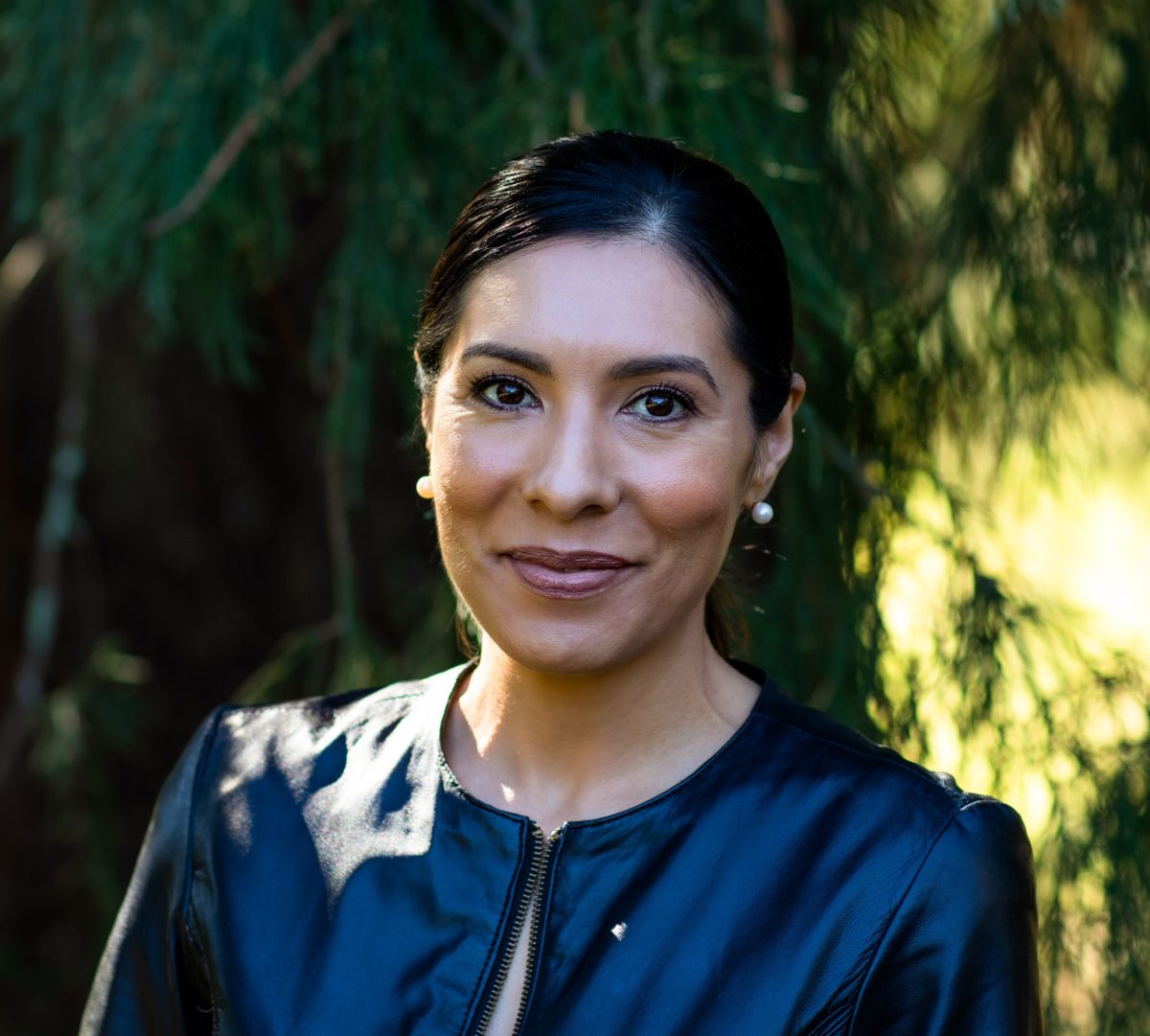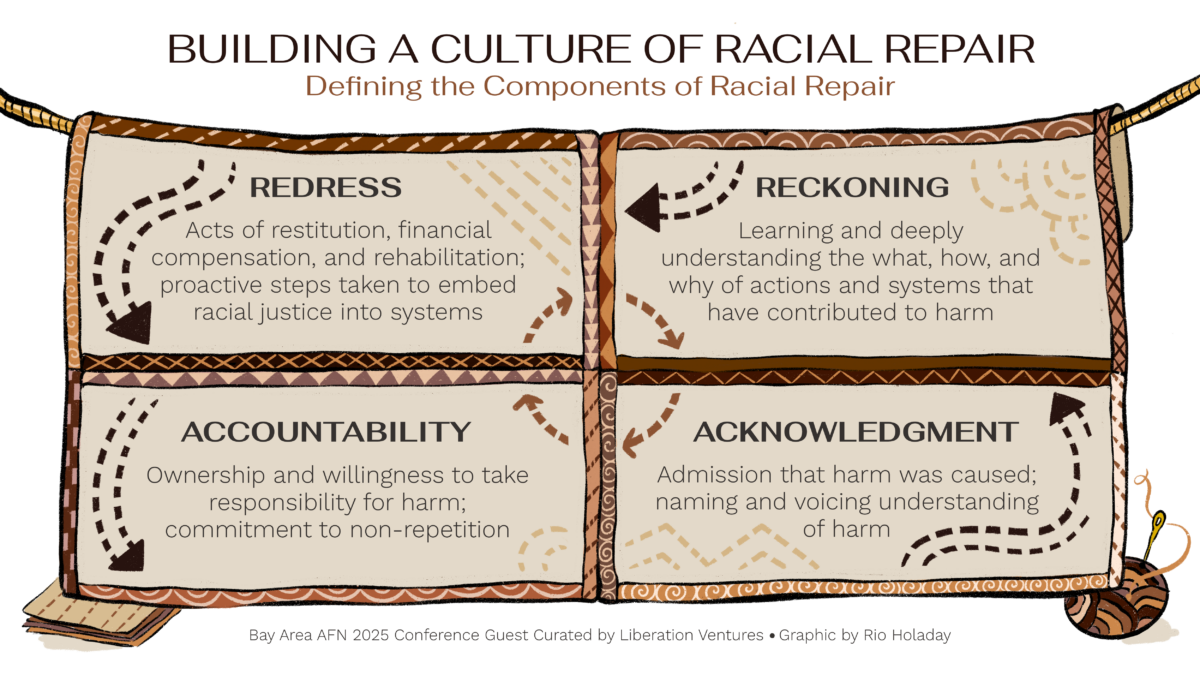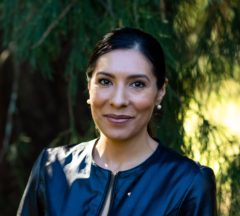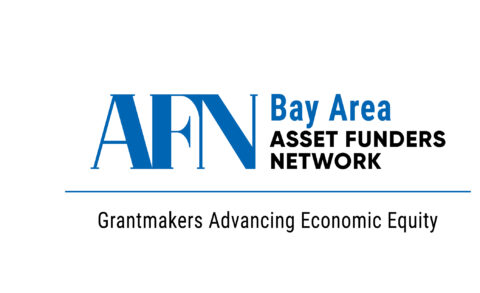
 FROM REBECA RANGEL, SENIOR DIRECTOR, ASSET FUNDERS NETWORK
FROM REBECA RANGEL, SENIOR DIRECTOR, ASSET FUNDERS NETWORK
APRIL 2025
AFN Short Take is a blog series highlighting insights and perspectives from recent AFN programming events.
On March 20, 2025, 150 economic justice and philanthropic leaders gathered in Oakland, California, to reckon with the root causes of America’s racial wealth inequities and explore a roadmap for repair. Amid a harmful political era, new ways of seeing, being, and doing the work to build a more just and equitable future emerged.
Bay Area AFN 2025 Conference: California Philanthropy: A Roadmap for Repair
Guest-curated by Liberation Ventures (LV), the conference offered attendees frameworks, ideas, and partners to better understand the role of repair, reparations, and reparative strategies in realizing wealth equity. Grounded in LV’s racial repair framework, the day was a deep exploration of how philanthropic institutions can harness the current regressive period not only to address the economic harm caused by settler colonialism, U.S. chattel slavery, and centuries of discriminatory systems, policies, and practices that continue into the present day, but to resource the equitable future we aspire.
“The truth is, the anti-democratic realities we face today are rooted in harms that were never fully addressed. Because this nation has failed to reckon with the historical and ongoing subversion of democracy for Black communities, we are now witnessing that spread more broadly. But history teaches us that periods of repression often fuel the very movements that undo them. To heal from these harms and to halt this backsliding, we must build a coalition toward a new political era—one that centers and demands repair.”
Aria Florant, CEO, Liberation Ventures
Building a Culture of Racial Repair
The racial repair framework developed by Liberation Ventures offers a powerful, iterative model to guide philanthropy in advancing racial and economic justice. As the central idea shaping this conference, it invites funders to apply reparative principles across their work to build a more just and equitable future.

Reckoning
A starting point in building a culture of repair is reckoning–defined as learning and deeply understanding the what, how, and why of actions and systems that have contributed to harm.
Addressing wealth inequities in the United States requires us to confront the reality that our society and economy are grounded in extermination and expulsion, extraction and exploitation, and exclusion upon exclusion based on one’s race, gender, birthplace, and more. It is impossible to address wealth inequities without being truthful about how wealth inequality originated and persists.
As Eric McDonnell, Chair of San Francisco African American Reparations Advisory Committee, explained, “Reckoning is fully recognizing the legacy of chattel slavery—its impact on the racial wealth gap, educational attainment, health disparities, and more. These legacies persist today and must be understood, acknowledged, and addressed, leading to the necessary steps of repair.” California Tribal Affairs Secretary Christina Snider-Ashtari implored attendees to face the state of deep-seated apathy. “California has an ethos of ignorance. Life is good here, and so you don’t think about the painful history. You don’t even learn about painful history. Most people in California don’t even realize there are California Indians here.”
As attendees learned about the work of the California Reparations Taskforce, the California Truth and Healing Council, and reparative efforts in local communities, the conference experience itself became a powerful example of reckoning, where attendees gained a deeper understanding of the root causes of our present-day wealth inequities.
Acknowledgement
The next step in the continuous and iterative process to build a culture of repair is acknowledgement–the admission that harm has been caused. This includes the naming and voicing of an understanding of harm.
Fiona Kanagasingam, Vice President of Equity and Culture at the Robert Wood Johnson Foundation, exemplified this step by sharing RWJF’s Truth, Repair, and Transformation process “to acknowledge the harms, to tell the truth about it in ways that are authentic, complete, and that disrupt some of the heroic narratives that we have often told about ourselves.” Kanagasingam also inspired her philanthropic peers to begin the process of building a culture of repair at their grantmaking institutions. “Without truth-telling and institutional repair, there is no sustainable transformation. The invitation to philanthropy is to engage in this work in whatever way possible. Not everyone can do everything, but naming hard truths about the past, and working to repair and ensure we don’t repeat past harms, can powerfully accelerate the transformation we’re committed to.”
Accountability
Accountability is ownership and willingness to take responsibility for harm, as well as a commitment to non-repetition.
The conference spotlighted several community-led, reparative efforts, such as guaranteed income demonstration projects, guaranteed inheritance pilots, and housing preference policies. Economic justice practitioners underscored the critical role philanthropy plays in resourcing the leaders and movements on the front lines of organizing and advocating for reparative solutions, and also urged philanthropy to make transformative shifts to design new systems and codify demonstration pilots into law.
Redress
Redress takes the form of acts of restitution, financial compensation, and rehabilitation. This includes taking proactive steps to embed racial justice into systems.
Attendees were inspired by the City of Palm Springs’ historic settlement earlier this year with survivors and descendants of Section 14. Pearl Devers, lead plaintiff and organizer, received a standing ovation for her courage and leadership in securing redress. Lead attorney Areva Martin noted, “Philanthropy played a crucial role in funding the experts we needed—PR, lobbyists, strategists—to move our strategy forward and achieve success. Whether it’s supporting education, narrative work, political advocacy, or coalition-building, philanthropy can make a major impact.”
Moving from Ideas to Action Generates Hope
Our gathering showed that applying a reparative framework can spark both momentum and hope. Attendees reported gaining new perspectives on repair as essential to achieving wealth equity, feeling more hopeful about actionable solutions, and left more committed to advancing these strategies in their philanthropic work.
Applying this reparative framework to achieve wealth equity requires philanthropy to think boldly and commit fully. In the words of Brandi Howard, East Bay Community Foundation CEO and Conference Planning Committee Chair: “For those of us working in philanthropy, we must understand that we are doing our work as legacy work. We have to think about our work in terms of generations. That means going beyond our bias for three- to five-year strategic plans in order to be impactful and make full use of philanthropy as a tool for change.”
Throughout the year, we will continue to lift up additional insights and recommendations from the conference. A recap of the 2025 Bay Area AFN Conference is available here.
An Echo Forward: Attendees join us for a virtual follow-up gathering
For conference participants, we are holding space to recap conference key takeaways, hear your reflections, and answer your questions on the racial repair framework. Register here to join us on May 8th at 11 AM, PST. This gathering will be an opportunity for attendees to engage with conference organizers and attendees, ask questions, and share how they have been processing and applying conference learnings.

